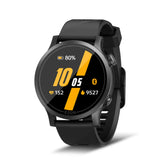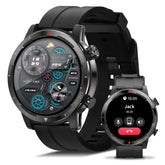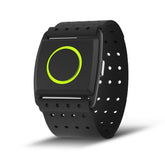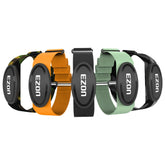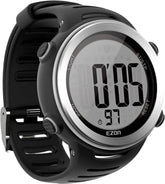Sleep & Athletic Performance: How Tracking Sleep Cycles Enhances Recovery
Athletic performance isn’t just built in the gym—it’s forged in the bedroom. Quality sleep is the unsung hero of recovery, and sleep tracking sports watches offer actionable insights from sleep cycle graphs to optimize training. This guide reveals how to decode sleep data, adjust training schedules, and boost endurance through science-backed rest.
1. The Science of Sleep and Recovery
A. The 4 Sleep Stages and Their Roles
| Stage | Percentage of Night | Key Benefits for Athletes |
|---|---|---|
| Light Sleep | 50–60% | Mental processing, transition to deep sleep |
| Deep Sleep | 15–25% | Muscle repair, growth hormone release |
| REM Sleep | 20–25% | Cognitive recovery, memory consolidation |
| Wakefulness | <5% | Normal part of sleep architecture |
B. Why Deep Sleep Matters for Endurance
- Growth Hormone (GH) Surge: 70% of daily GH releases during deep sleep, critical for muscle repair and fat metabolism.
- Lactic Acid Clearance: Deep sleep reduces post-workout soreness by 30%, as tracked by reduced morning muscle tenderness.
2. How Sleep Tracking Watches Optimize Recovery
A. Decode Your Sleep Cycle Graph
-
Key Metrics:
- Sleep Efficiency: Time asleep vs. time in bed (aim for >85%).
- Stage Distribution: Ensure 15–20% deep sleep and 20% REM sleep.
- Resting Heart Rate (RHR): A rise in RHR signals poor recovery.
- EZON Watch Feature: Use the sleep tracking sports watch app to view nightly graphs and identify trends (e.g., “Low deep sleep on nights after intense workouts”).
B. Smart Alarm Technology
- Optimal Wake Window: Set alarms to ring during light sleep (30-minute window before your target time), using accelerometer data to detect gentle movement.
- Example: If aiming to wake at 6:30 AM, the watch wakes you between 6:00–6:30 AM when in light sleep, reducing grogginess.
3. Adjust Training Schedules Based on Sleep Data
A. Post-Poor Sleep Protocol
-
If Deep Sleep <15%:
- Training Modification: Swap high-intensity intervals (Zone 4–5) for Zone 2 endurance work (60–70% MHR).
- Rest Day Priority: Use watch alerts to schedule a “recovery day” with yoga or walking.
B. Pre-Event Sleep Strategy
-
3 Nights Before Competition:
- Aim for 1 extra hour of sleep/night, focusing on increasing REM sleep for mental sharpness.
- Use watch-guided breathing exercises (4-7-8 technique) to lower pre-race anxiety.
C. Nightly Routine for Athletes
| Time | Activity | Sleep Preparation |
|---|---|---|
| 7:00 PM | Light stretching | Trigger relaxation response |
| 8:30 PM | Warm shower (38°C) | Lower core temperature for sleep onset |
| 9:00 PM | No screen time | Avoid blue light suppression of melatonin |
| 10:00 PM | Sleep (target bedtime) | Use watch’s sleep mode to block alerts |
4. Nutrition for Better Sleep and Recovery
A. Pre-Sleep Fuel
- Tryptophan-Rich Foods: Turkey, cottage cheese, or cherries 1 hour before bed to boost melatonin.
- Hydration Balance: Avoid alcohol and caffeine after 2 PM—both disrupt deep sleep architecture.
B. Post-Sleep Recovery
- Morning Protein: 30g within 30 minutes of waking (e.g., eggs + spinach) to support muscle repair initiated during sleep.
- Electrolyte Replenishment: Drink water with magnesium (natural sleep aid) if watch data shows restless sleep.
5. Common Sleep Mistakes to Avoid
-
Ignoring Consistency:
- Solution: Keep bedtime within 30 minutes of the same time daily, even on weekends.
-
Overtraining for “Faster Recovery”:
- Solution: Use sleep cycle graphs to ensure training load matches recovery (e.g., high-intensity days only after high deep sleep nights).
-
Neglecting Sleep Environment:
- Solution: Maintain 18–20°C room temperature, use blackout curtains, and remove electronics from the bedroom.
6. Gear Recommendations for Sleep Tracking
A. Top Sleep Tracking Sports Watches
| Model | Key Features | EZON Series Link |
|---|---|---|
| EZON Sleep Pro | Advanced sleep staging, smart alarm | Shop Now |
| EZON Recovery Watch | HRV analysis, bedtime reminders | Shop Now |
B. Complementary Tools
- Blue Light Glasses: Wear post-6 PM to protect melatonin production.
- Weighted Blanket: 10–15% of body weight to reduce anxiety and improve deep sleep.
7. FAQs: Your Sleep Performance Questions Answered
Q: How much sleep do athletes need?
- 7–9 hours/night for most; endurance athletes may need 9–10 hours to support recovery.
Q: Can napping replace lost night sleep?
- Short naps (20–30 minutes) improve alertness but don’t fully replace deep sleep. Use watch alarms to avoid groggy “sleep inertia” from long naps.
Q: Best time to check sleep data for training adjustments?
- Review nightly reports in the morning to inform same-day training decisions (e.g., “Low REM sleep = focus on technique, not intensity”).
Sleep Your Way to Peak Performance
With a sleep tracking sports watch as your recovery coach, you’ll transform sleep from passive rest to active performance enhancement. Use sleep cycle graphs to fine-tune training, nutrition, and routines, ensuring every workout is supported by optimal rest.
Remember, athletes don’t just train hard—they recover smarter. Prioritize sleep, trust the data, and let your body’s natural repair mechanisms supercharge your endurance and resilience. The starting line of your next PR begins in the bedroom.
EZON Watch: Professional sports technology brand
https://ezonwatch.com
https://ezonwatch.com
